Artificial Intelligence might be the brain of modern enterprises, but metadata is its memory and reasoning power. It is the ‘invisible’ engine that gives AI the context, meaning, and structure it needs to make accurate decisions. Think of metadata as the blueprint that tells your AI what data represents, where it comes from, how it’s structured, and how it should be interpreted.
Table of Contents:
- Introduction
- Problem: AI Investment, Low Returns
- Problem: Why Your AI POCs Are Stuck
- Problem: No Trust or Traceability
- Solution: Metadata as a Strategic Asset
- Business Benefits for CXOs
- Use Cases of Metadata
- How to Start: Your Metadata Action Plan
- Conclusion: CXO Takeaway – Metadata First, AI Success Follows
Without this context, even the most advanced AI models are just guessing. They may process massive volumes of data, but with inconsistent or missing metadata, they cannot differentiate between relevant signals and background noise. The result? Poor predictions, unreliable insights, and expensive failures.
In simple terms: Your AI is only as smart as your metadata. Just as a self-driving car needs clearly marked road signs, AI needs clean, well-structured metadata to navigate vast data landscapes and deliver trustworthy, actionable results.
Problem: AI Investment, Low Returns
Across industries, enterprises are investing heavily in AI with hopes of predictive precision, automation at scale, and faster decision-making. Yet, months—or even years—into these initiatives, many CXOs are seeing a different reality: ballooning costs, delayed timelines, and underwhelming insights.
The root cause is not always the AI model itself, but the metadata—or lack thereof—supporting it. Metadata, essentially “data about data,” gives AI the context it needs to interpret information accurately. When it’s messy, inconsistent, or missing altogether, the smartest algorithms are left making guesses rather than delivering trustworthy insights.
The Domino effect of bad metadata
-
Poorly labeled data leads to poor accuracy: Models trained on inconsistent or poorly tagged datasets struggle to recognize relationships, leading to misclassifications and wrong predictions.
-
Endless rework on models means budget wasted: Data scientists spend 60–80% of their time cleaning, labeling, and relabeling data instead of innovating, driving operational costs.
-
Slow time-to-value results in a competitive disadvantage: Every delay in refining models and retraining means competitors leveraging clean, metadata-rich systems are pulling ahead.
For leadership, this creates a vicious cycle: big AI investments with minimal returns. Projects remain stuck in experimentation, POCs don’t move to production, and stakeholders lose faith in AI’s promised ROI. The narrative shifts from “AI will transform our business” to “AI is just an expensive science experiment.”
The truth? Your AI is only as effective as the metadata fueling it. Without clear data lineage, semantic consistency, and rich tagging, even the most advanced models will underperform—turning million-dollar AI dreams into costly lessons.
Problem: Why Your AI POCs Are Stuck
Why Promising AI Pilots Get Stuck in Limbo
Many enterprises proudly showcase successful AI Proof of Concepts (POCs) as a predictive maintenance model that works in one plant, a customer churn predictor that nails accuracy in a controlled dataset, or a fraud detection system that performs brilliantly in a test environment.
But here’s the reality check: most POCs never scale to full production.
POC Success
Every AI Proof of Concept looks like a success story at first glance. The AI model gets executed flawlessly in a single given instance, delivers high accuracy for given datasets, and performs exceptionally in a test environment. All these give CXOs the feel of achieving a breakthrough in AI. But as the proverb goes – Don’t count your chickens before they hatch – celebrating AI success is very early because success in a test environment is completely different from AI success on a live scale.
Scaling Pain
The real pain is experienced when AI models are shifted from pilot to production. Fragmented metadata repository that is maintained separately by data engineering, data science, and operations teams create a huge roadblock. AI models that work accurately in test environments start lagging or perform poorly when loaded with enterprise-grade metadata. This results in delayed deployments.
Business Loss
For CXOs, the ultimate consequences are quite painful. Millions of dollars are invested to prove a given AI model’s worth and potential. While your competitors are transforming their AI POCs into full-fledged real-time AI models, you get trapped in the endless cycle of experimentations and missing out on revenue generation opportunities.
Problem: No Trust or Traceability
When AI Becomes a Black Box – and No One Trusts the Results
AI promises smarter decisions, but for many enterprises, it ends up creating a dangerous problem: no one knows how those decisions were made. Without proper metadata lineage and traceability, AI becomes a black box—producing outputs that are difficult, if not impossible, to audit or explain.
The Risks of Zero Transparency
-
No lineage, no trust: If you can’t trace back which metadata repository, labels, or transformations influenced a prediction, business users—and regulators—won’t trust it.
-
Compliance nightmares: In regulated industries like banking, healthcare, and insurance, the inability to demonstrate data lineage and explain model decisions can lead to audit failures, regulatory fines, and reputational damage.
-
Opaque models, high risk exposure: Executives are left in the dark, unable to answer critical questions: Why did the model deny a loan? Why did it flag this transaction as fraud?
For CXOs, this lack of trust erodes confidence in AI initiatives. Business stakeholders push back on AI recommendations; legal teams raise red flags, and regulatory bodies scrutinize every decision. AI adoption stalls not because the technology fails, but because no one can confidently defend its outputs.
In industries where accountability is non-negotiable, this can be catastrophic. A single unexplained model decision can trigger customer backlash, legal disputes, or even regulatory intervention.
Without a robust metadata strategy providing real-time lineage, explainability, and governance, enterprises are essentially flying blind—risking both financial losses and brand credibility.
Recommended Reading:
Solution: Metadata as a Strategic Asset
If scattered or missing metadata is the “killer of AI success”, then treating metadata as a strategic asset for your enterprise is the remedy. Rather than considering it as an “extra”, leading organizations are now focusing on metadata governance being the core AI enabler.
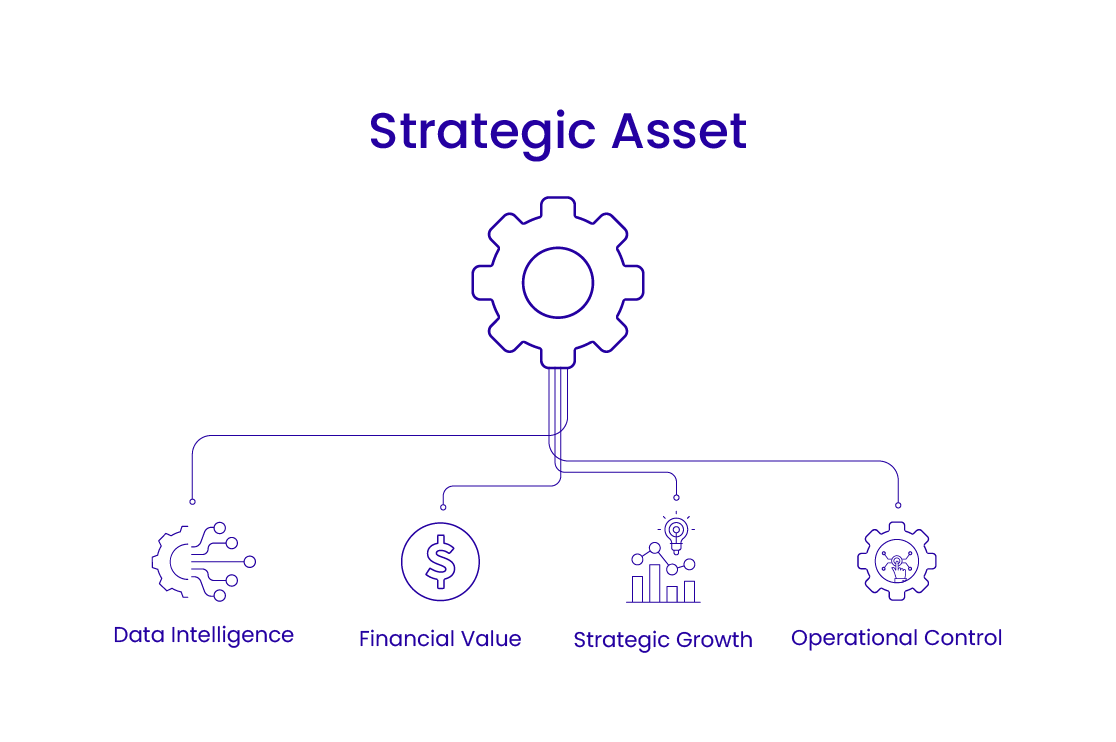
By synchronizing metadata across systems and teams, enterprises can:
-
Create a Single Source of Truth: Standardized labels, consistent taxonomies, and unified data catalogs eliminate silos, allowing AI models to scale seamlessly across departments.
-
Enable Real-Time Lineage & Explainability: With proper tagging and lineage tracking, every AI decision can be traced back to its source, improving trust, transparency, and audit readiness.
-
Boost Model Accuracy & Efficiency: Rich, contextual metadata repository ensures models train clean, well-structured data, dramatically improving prediction accuracy and reducing costly rework.
When the metadata strategy is governed properly, AI stops being a black box. Business leaders can confidently explain decisions to regulators, data scientists can focus on innovation instead of endless data wrangling, and CXOs can finally see the AI ROI they expected from the investment.
Metadata isn’t just “data about data.” It’s the nervous system that connects your entire AI ecosystem, enabling:
-
Scalability – Moving POCs into enterprise-wide production faster.
-
Trustworthiness – Ensuring compliance and boosting stakeholder confidence.
-
Competitive edge – Turning data into actionable insights faster than competitors.
In short, treat metadata like an asset, not an afterthought, and your AI will go from underperforming experiments to a reliable business transformation engine.
Business Benefits for CXOs
For CXOs, every AI initiative is judged not by technical brilliance but by business outcomes—faster decisions, higher revenue, lower risk, and stronger compliance. Treating metadata as a strategic asset directly impacts these metrics, turning AI from a cost center into a true growth driver.
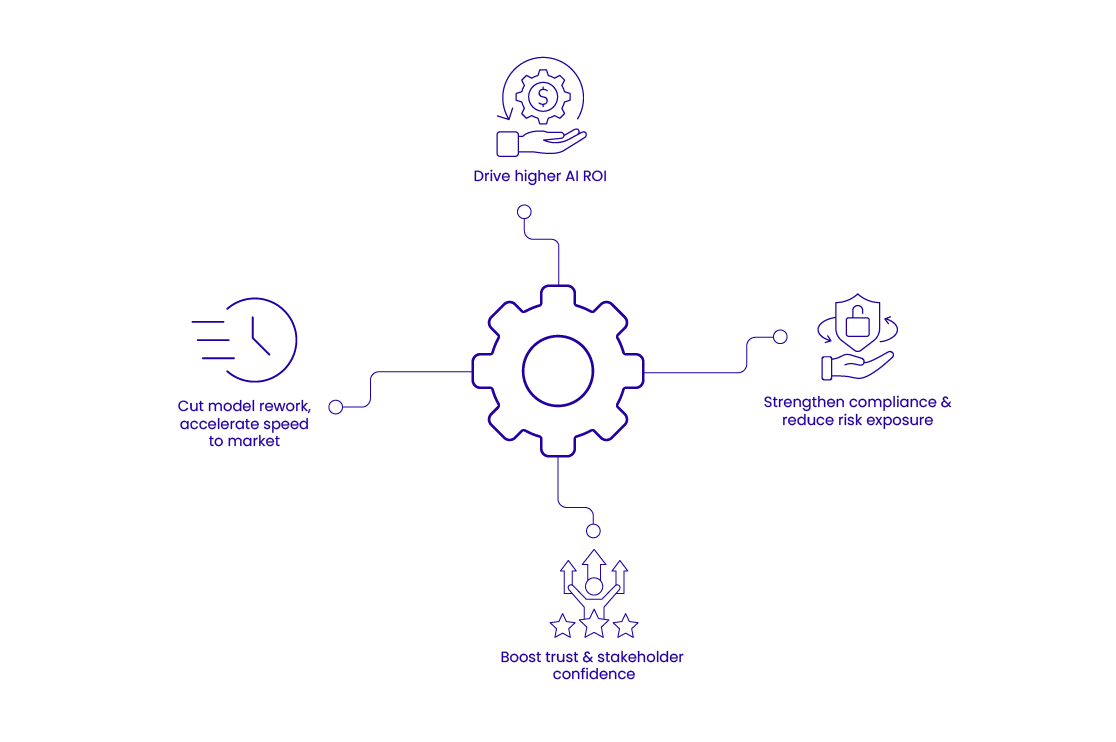
Cut model rework, accelerate speed to market
Inconsistent metadata is a primary barrier to scalable AI. Data scientists spend 60–80% of their time cleaning and labeling data instead of building models. By establishing centralized metadata strategy for governance, CXOs can gain faster deployment of AI use cases, reduced time-to-value, and a competitive edge in innovative cycles.
Drive higher AI ROI
Every time a model needs retraining due to poor labeling or inconsistent data definitions, costs spike. A clean, contextual metadata repository minimizes model drift and reduces retraining expenses, ensuring AI investments deliver sustainable returns. CXOs can experience significant cost savings and predictable ROI from these AI initiatives.
Strengthen compliance & reduce risk exposure
For industries like finance, healthcare, and insurance, regulatory compliance is something which cannot be negotiated. Metadata-driven lineage and traceability make AI decisions explainable, helping enterprises pass audits with confidence. This lowers the regulatory risks, leading to lesser legal challenges and improving brand credibility.
Boost trust & stakeholder confidence
In scenarios where predictions made by AI can be explained, business users are likely to trust the system more. The confidence of stakeholders speeds up the adoption rate of AI throughout the organization. In contrast to the idea of AI shifts considered as “risky experiments”, they are now viewed as trustable decision-making partners.
In a competitive, data-driven economy, metadata is no longer just an IT concern; it’s a boardroom priority. The organizations that treat it as such will be the ones to realize exponential AI-driven business value.
Use Cases of Metadata
Here are a couple of use cases wherein CXOs can easily understand the importance of metadata in developing AI models.
-
Data discovery & cataloging: AI-powered data catalogs leverage metadata to automatically classify, tag, and index large volumes of structured and unstructured data. Tools like Alation or Collibra use metadata to help data scientists quickly find the right training datasets for AI models.
-
Data quality & preprocessing: Metadata captures information about data accuracy, completeness, freshness, and lineage, helping AI systems filter out poor-quality data before training. AI models can automatically discard records marked with outdated timestamps or incomplete fields via metadata tags.
-
Edge AI optimization: Metadata about hardware capabilities, latency requirements, and model size helps select the most suitable AI models for edge devices. AI systems in IoT devices such as smart watches use metadata to decide whether to run models locally or in the cloud.
-
Metadata for an AI Dataset: Metadata in AI datasets acts as the backbone for data discovery, preparation, and governance. It provides context (what the data represents), quality indicators (how reliable it is), and lineage (where it comes from and how it was transformed). This is crucial for predictive analytics, optimizing operational workflows, and improving customer interactions.
How to Start: Your Metadata Action Plan
Transforming metadata from a scattered, IT-managed afterthought into a strategic enabler of AI success doesn’t have to be overwhelming.
Here’s a CXO-friendly action plan to get started.
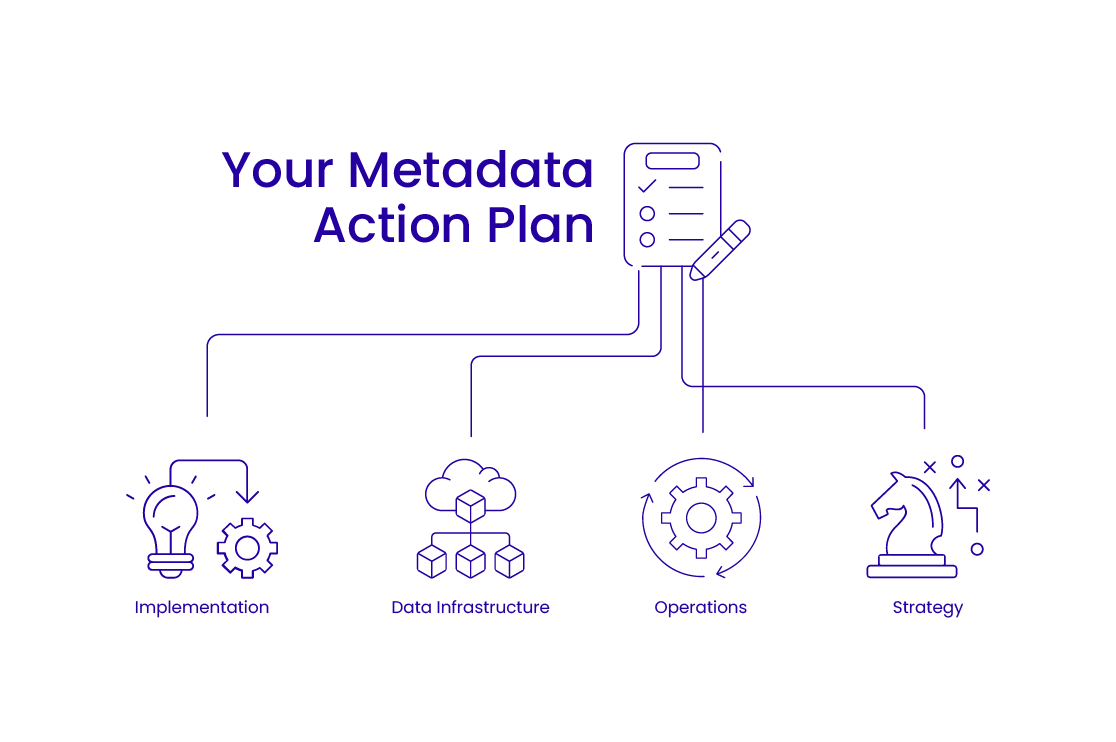
Recognize the gaps & extraction in Metadata
Start by performing an audit of the current metadata repository sources to highlight missing, inconsistent, or any outdated metadata. Monitor the origin of the data, its movement patterns, and how it gets reshaped prior to being fed into the AI models. It would be feasible to include all the teams involved to make sure everyone stays on the same page and has a clear understanding of the data.
Regulate and administer metadata in different systems
Here, you need to set up enterprise scale metadata governance policies where all labels, taxonomies, and quality of data can be made consistent across different teams. Also, create a centralized repository or a sort of catalog for the metadata to reduce the chances of siloed data. Real-time updates to the metadata need to be ensured because this would allow AI models to incorporate the most accurate data.
Implement the correct metadata tools
One of the most important parts is to focus and invest in platforms that have been specifically developed to deal with enterprise-grade metadata repository. Some of the popular platforms include Alation & Collibra, Snowflake, and Databricks. These tools integrate with existing data platforms without any hassle, thereby decreasing any operational expense while speeding up ROI realization.
Connect metadata to MLOps & AI workflows
Just like humans, metadata should not be kept isolated. Proper usage of the metadata includes incorporating it into the MLOps pipelines for updating the AI models in sync with any fluctuation in the data. By connecting metadata to AI workflows, it allows the transformation of the AI model into an active intelligence decision-making partner.
Conclusion
AI success isn’t just about sophisticated algorithms or massive datasets about trustworthy, well-governed metadata. Without clean, consistent, and contextual metadata, even the most expensive AI initiatives will underperform, stay stuck in pilot phases, or expose your business to regulatory and reputational risks.
It is important to consider and treat metadata not as a secondary tool or thing; consider it a strategically important asset. Focus on incorporating the correct set of governance policies & right tools to incorporate the metadata repository directly into AI and MLOps workflows.
So, what would the CXOs get in return?
They get – faster rate of AI deployments, decreased rework on the AI models, better adherence to compliance standards, and a massive boost to stakeholder confidence & AI ROI. These benefits are what CXOs would reap through proper implementation of metadata.
Remember that smarter metadata, smarter AI, and smarter business decisions are all inter-related.
FAQ: Metadata & AI – What CXOs Need to Know
Why does metadata matter in AI? Metadata provides context, structure, and meaning to raw data, helping AI models understand what they are analyzing. Without it, AI models work blindly, leading to poor predictions, model drift, and wasted investments. Think of metadata as the instruction manual for your AI.
How does metadata affect model accuracy? High-quality metadata ensures models are trained in clean, properly labeled, and contextually relevant data. Poor or inconsistent metadata repository confuses algorithms, causing misclassification, bias, and low accuracy.
What are the top metadata tools for AI initiatives? Alation & Collibra, Snowflake, Informatica, Talend, and Databricks are some of the popular metadata tools that have proven to be useful in AI initiatives.
Can metadata improve AI compliance? Absolutely. Metadata enables lineage tracking, audit trails, and explainability, making it easier to prove how AI models make decisions. This is critical for regulated industries like banking, healthcare, and insurance, where non-compliance can lead to fines or legal action.
How is metadata used in Generative AI? Metadata plays a very vital role in Gen AI by offering context, meaning, and structure to the data which boosts the AI model’s ability to process, understand, and develop content. Metadata facilitates the generative ai systems to make sense of the data given to them for delivering relevant outputs.











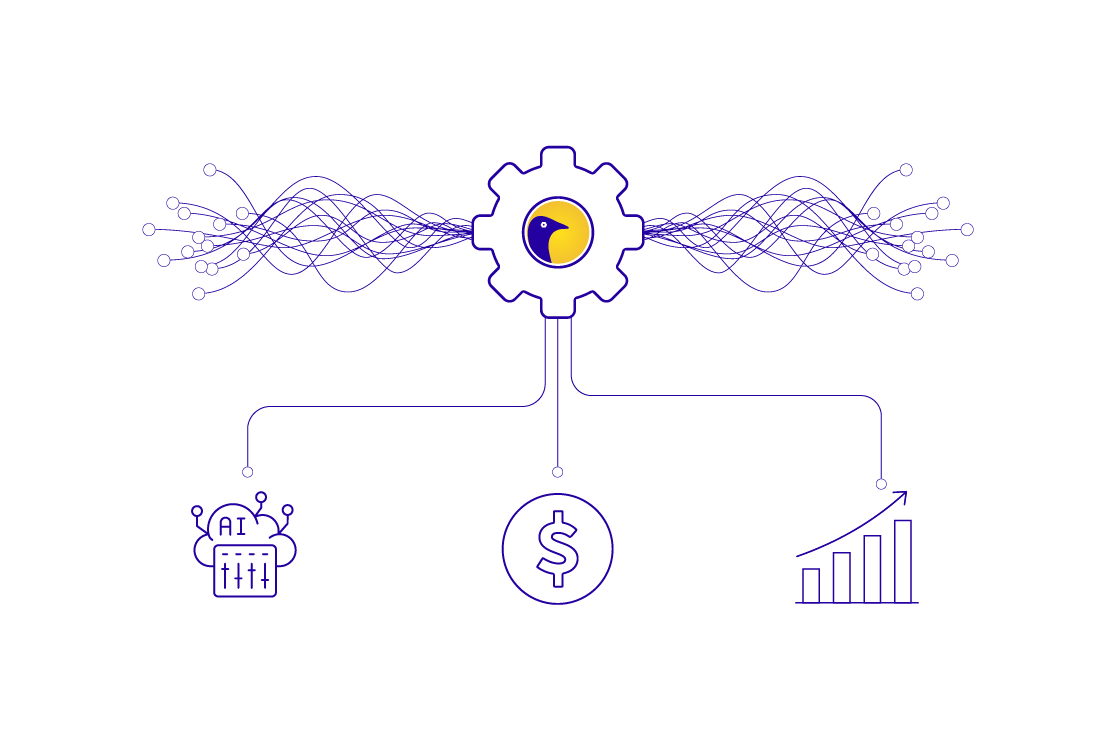
 AI Algorithms for Business Decisions: How They Deliver Real Value & Growth for CXOs
AI Algorithms for Business Decisions: How They Deliver Real Value & Growth for CXOs  AI in Programming: Disruption, Evolution, and CXO Strategy
AI in Programming: Disruption, Evolution, and CXO Strategy  AI in Healthcare Administration: Cutting Costs & Boosting Efficiency
AI in Healthcare Administration: Cutting Costs & Boosting Efficiency 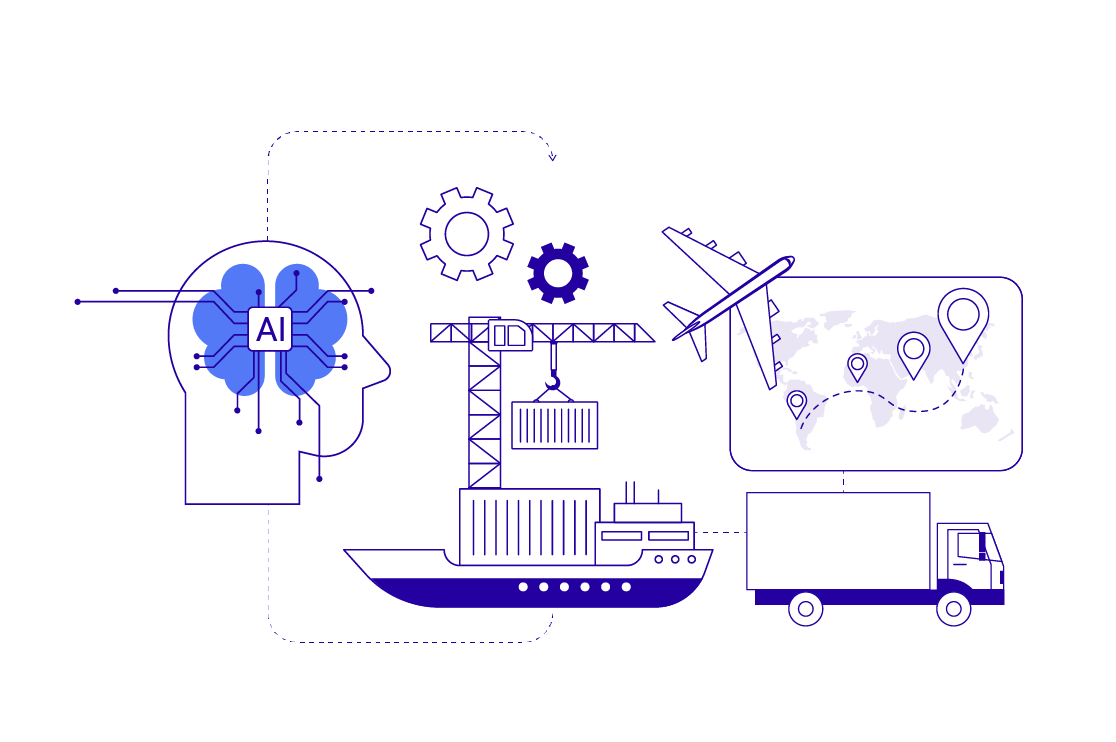 AI for Supply Chain Resilience & Optimization: Strategies for 2026 and Beyond
AI for Supply Chain Resilience & Optimization: Strategies for 2026 and Beyond 
